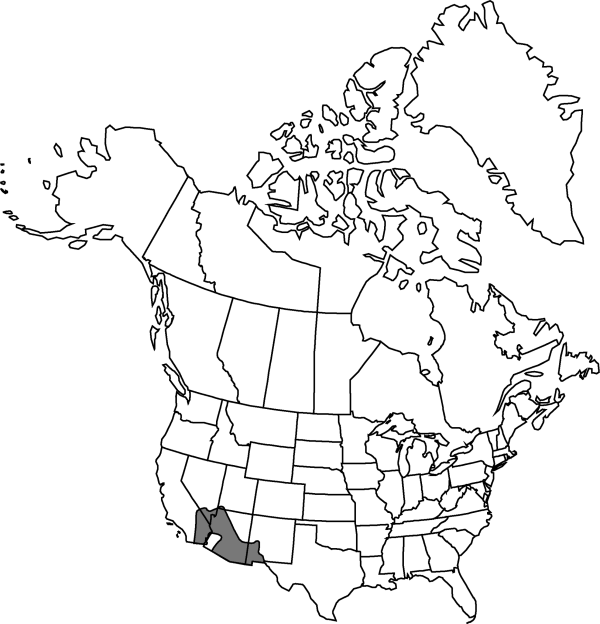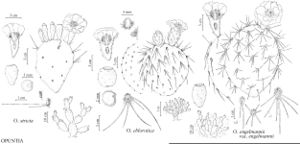Opuntia chlorotica
Proc. Amer. Acad. Arts 3: 291. 1856.
Trees or shrubs, erect, 2–2.5 m, with spiny, well-defined trunk to 30 cm diam. Stem segments not disarticulating, blue-green, flattened, obovate to circular, 13–21 × 11.5–19 cm, nearly smooth, glabrous; areoles 7–10 per diagonal row across midstem segment, subcircular to elliptic, with basal ridge, 3–6 × 2.5–4 mm; wool tan, aging grayish white. Spines absent or usually in distal areoles to evenly distributed over entire stem segment, yellow, aging red-brown to blackish, straight or weakly curved, ± acicular, deflexed, or some erect in marginal areoles; larger spines 0–7 per areole, terete or basally flattened, 25–45 mm, usually accompanied by few straight to wavy bristle-spines. Glochids crowded in narrow crescent along adaxial margins, longer toward base of areole margins, subapical tuft absent or poorly developed, yellow, aging reddish brown, to 14 mm. Flowers: inner tepals yellow (sometimes with reddish blush near base), abaxially reddish streaked along midveins, broadly spatulate-apiculate, 18–30 mm; filaments white to yellow; anthers; style and stigma lobes white, yellowish, or pale green. Fruits red, barrel-shaped, 30–60 × 18–40 mm, fleshy (often mummifying), glabrous, spineless; umbilicus 6–9 mm deep; areoles 40–68. Seeds yellowish, 3.5–4 × 3–3.5 mm, 1.5–1.8 mm thick, reniform to subcircular, flattened, often warped; girdle protruding 0.1–0.5 mm. 2n = 22.
Phenology: Flowering spring–summer (Apr–Jul).
Habitat: Desert grasslands, woodlands, chaparral, desert flats, rocky ledges, hills, canyons
Elevation: 600-2400 m
Distribution

Ariz., Calif., Nev., N.Mex., Utah, Mexico (Baja California, Baja California Sur, Sonora).
Discussion
Opuntia chlorotica hybridizes with O. santa-rita in southeastern Arizona and with the hexaploid O. phaeacantha forming the tetraploid O. ×curvispina in areas of Arizona, California, and Nevada.
Selected References
None.
